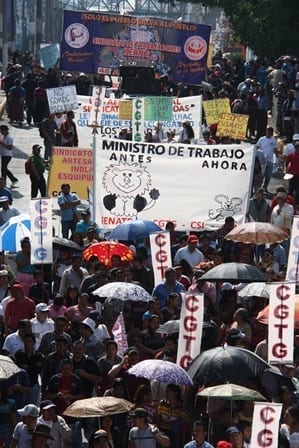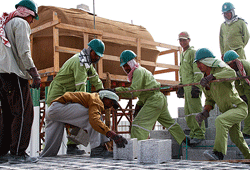May 23, 2013
Secretary General Sawit Kaewwan of the State Enterprises Workers’ Relations Confederation (SERC) and President Aung Kyaw of the Migrant Worker Rights Network (MWRN) received awards yesterday in Washington, D.C., for their work to protect and promote the rights of migrant workers in Thailand. The International Labor Rights Forum (ILRF) presented the labor rights defenders awards to Kaewwan, Aung Kyaw and others May 22 in an event hosted by the American Federation of Teachers (AFT).
“Before the Migrant Worker Rights Network, there were no organizations inside Thailand dedicated to promoting and defending the rights of the hundreds of thousands of Burmese migrant workers at work,” said Solidarity Center Executive Director Shawna Bader-Blau, who presented their awards.
SERC is largest labor union organization in Thailand representing more than 180,000 members in state-owned enterprises.
“Our awardees tonight are innovators in thinking about how do we come up with the global networks and the grassroots organizing that can help provide a counterbalance to the ever- sprawling global corporate supply chains,” said Judy Gearhart, ILRF executive director. “Because there needs to be that possibility for workers to speak up and have a voice vis-a-vis their employers whether or not their employers—the ones that have the influence—are thousands of miles away or in their home country.”
U.S. Senator Tom Harkin also received an award from the ILRF for championing the rights of workers at home and abroad and promoting labor rights conditionality clauses in U.S. trade agreements.
MWRN, founded by Burmese migrant workers in 2009, with support from the Solidarity Center and Human Rights and Development Foundation, has organized migrant workers into an informal trade union network. Its membership has grown to more than 700 workers, who labor primarily in seafood processing plants and also in the auto parts and plastics sectors and furniture-making industry.
Legally, migrants are prohibited from organizing or forming a union or collective bargaining in Thailand, which has not ratified core ILO Conventions 87 and 98 guaranteeing the freedom of association and the right to bargain collectively. More than 75 percent of the workforce—including Thai workers and more than 2.5 million migrant workers—is prohibited or severely limited by law and practice from exercising these fundamental human and labor rights.
In 2012, MWRN hosted an historic and high-profile visit by Burmese democracy advocate Aung San Suu Kyi. During her visit, she held a private meeting at the MWRN office to hear migrant worker concerns and recommendations to improve their labor rights. Aung San Suu Kyi then brought their issues to the Thai government and promised to work with the authorities to address their problems. Migrant workers in Thailand often face dangerous working conditions, workplace injuries, unpaid wages, fear of employer retaliation and threats, extortion and forced labor and trafficking.
By enabling migrant Burmese workers in Thailand to “join together to stand up to major seafood manufacturers and exporters and demand safer conditions and fair wages, they can win;” said Bader-Blau. “And when railway workers in Thailand can organize, they can tell their bosses, ‘No’ to unsafe working conditions, they can save lives.”
May 23, 2013

With few or no safety measures in place, Ukraine has the world’s highest coal mine deaths.
Freedom of association and the ability of civil society organizations to fully function in Ukraine are in jeopardy as the country increasingly moves away from democracy. Only international attention and solidarity have slowed these disturbing trends.
“There is constant pressure on non-governmental organizations (NGOs) from oligarchs, media, the security system and the courts,” said Mykhailo Volynets, chairman of the Confederation of Free Trade Unions of Ukraine (KVPU).
Volynets, who met with Solidarity Center staff in Washington, D.C., as part of a recent visit to the United States, described an environment of more subtle pressure against NGOs than practiced in Russia, where a new law passed in January severely restricts their operation.
Yet attacks on worker rights and the nation’s blossoming free trade movement have not been as subtle. A proposed labor code would legalize lockouts, allow unlimited work days and weeks, and enable employers to monitor workers at the workplace. The draft code is so ambiguous, said Volynets, “employers will always find a provision that is beneficial” to them. Further, workers and their unions have no recourse in the courts, because “90 percent of court rulings are so unfair, they side with the employers and authorities.
“The authorities are creating a situation in which civil society cannot develop. Specifically, unions can’t develop,” said Volynets, whose confederation is one of the few dynamic civil society organizations in Ukraine.
The KVPU, a Solidarity Center partner, has a strong presence in regions were few other progressive civil society groups have reach.
Worsening worker rights has resulted in a growing “shadow economy,” with 30 percent to 40 percent of wages paid off the books, Volynets estimates. Those who support themselves through such work will never have pensions, he says. In addition, some 30 percent of young workers under age 25 never have had a job, said Volynets, and their future is bleak.
Volynets, who also heads Ukraine’s Independent Trade Union of Miners, described the potentially deadly conditions in the nation’s nonunion mines, where miners work deep underground in areas that often lack structural support and have little or no safety measures in place. Volynets estimates some 50,000 Ukrainians labor in such mines. Ukraine has the world’s highest coal industry death rate. In 2011, 161 Ukrainian coal miners died in workplace accidents. Ukraine’s mining industry has become a major part of the national economy in recent years, accounting for roughly 4.4 percent of the country’s gross domestic product (GNP). The increasing difficulty workers face in forming unions means miners at these dangerous worksites have no collective voice to challenge unsafe working conditions.
Volynets, the 2004 recipient of the AFL-CIO George Meany-Lane Kirkland Human Rights Award and a former member of the Ukrainian parliament, also offered a measure of hope when he cited instances in which government efforts to restrict worker rights were rescinded after international union support. In the most recent example, a 2012 law that effectively prohibited much collective bargaining was rescinded after the KVPU filed a complaint with the International Labor Organization (ILO).
May 20, 2013
At least 23 garment workers were injured today when a structure the workers used for rest breaks collapsed in Cambodia. The collapse comes just days after two workers were killed when a ceiling caved in at a Cambodian shoe factory.
Over the weekend, the owner of the Wing Star Shoe factory said negligence led to the collapse of an overloaded storage bin. He also said in a press conference last week that he does not expect to be prosecuted for the deadly incident. Another Wing Star official called the tragedy “a small incident.” Meanwhile, workers have been told to report back to work, despite government assurances on the day of the tragedy that a full investigation would take place.
“Although Cambodian garment factories have been hailed as providing safer working conditions than those in Bangladesh, that does not constitute a safe industry,” says Solidarity Center Cambodia Country Program Director David Welsh. “Of the 100 factories audited on an ad hoc basis, 25 were found to have safety and health violations,” he said, citing a recent International Labor Organization (ILO) report.
The report found “a worrying increase in fire safety violations,” in which only 57 percent of factories kept paths free of obstructions. The study, part of the ILO’s “Better Factories Cambodia” project, showed a large drop in compliance in fire safety measures, with the number of garment and footwear factories abiding by the legal requirement to keep access paths free of obstructions “unprecedentedly decreasing from 87 percent to 57 percent compliance.”
The ILO findings belie a statement by the Garment Manufacturers Association in Cambodia that the factory collapse was a one-time occurrence. A separate report on a pilot project on footwear factories found they were not in compliance with a host of labor standards, especially regarding occupational safety and health. Chemical safety is a special concern, because the use of toxic solvents is much more widespread than it is for clothing.
A spokesman for Wing Star Shoe factory also said the company will pay the cost of the two victims’ funerals and the medical bills of the 14 workers injured. The family of one of the workers killed said she was 15 years old.
Yet the Phnom Penh Post reports that families were told they had to take the amount the company offered or get nothing—and the compensation was significantly less than they had sought.
According to the Post: Rim Rorn, 29, uncle of Rim Roeun, 22, who died in the collapse, said talks between his family and factory representatives had broken down. “The representatives told us to accept their offer . . . or it’s hopeless for us.”
The garment and shoe manufacturing industry is Cambodia’s largest formal employer, with 500,000 workers in more than 500 factories, and generated $4.6 billion in exports in 2012. Most garments and shoes are exported to the United States and the European Union.
The May 16 tragedy follows the April 24 collapse of the Rana Plaza building in Bangladesh, where 1,127 garment workers were killed. The eight-story building housed five garment factories and a government inquiry pointed to shoddy construction as the prime trigger of the collapse.
May 17, 2013

Workers rally for justice for murdered trade unionists during May Day events in Guatemala City. Credit: Stephen Wishart
Worker rights groups are urging the Guatemalan government to bring justice to the families of the more than 56 trade union leaders killed in the past three years. No one has ever been convicted in Guatemala for killing a union leader.
The Trade Union Confederation of the Americas (TUCA) has written to President Otto Perez Molina asking for action to resolve the murders of union leaders and for a commitment to guarantee the right to freedom of association and collective bargaining. TUCA, the regional structure of the International Trade Union Confederation (ITUC), represents more than 50 million workers.
In the letter, TUCA states the murders and the numerous acts of torture, kidnappings, raids and death threats have created a culture of fear and violence throughout the country accompanied by an unrelenting series of violations of freedom of association and the right to collective bargaining.
TUCA also writes that the global trade union movement was surprised by the 2013 Report by the International Labor Organization Committee of Experts which cited the government’s progress in resolving numerous cases.
“While progress was reported in these cases, the report fails to share information on concrete results or sentences in a single case. Of most concern is that of the 58 killings admitted by the government over the last six years, only in two cases has the government declared trade union activities as the motive. The other deaths are included among the so-called common crimes such as ‘extortion,’ ‘personal differences’ or ‘crimes of passion.’”
Over the past 20 years, the international community has appealed to the Guatemalan government to address serious human rights violations, to little effect. In addition, Guatemalan unions have sent detailed recommendations for improved labor rights compliance to its government, filed under the Dominican Republic-Central American Free Trade Agreement (DR-CAFTA) complaint process. In 2008, six Guatemalan trade unions filed a complaint about the suppression of worker rights under the trade agreement. The case advanced to the dispute resolution phase in 2011 and is still pending.
TUCA writes that the Rios Montt verdict, “achieved through a profound mobilization of Guatemalan civil society, must now be consolidated, and extended to all sectors of society who suffer the weight decades of violence and impunity. The labor movement, in particular, continues to be one of the main targets of this repression.”
May 16, 2013

The Qatar Foundation’s guidelines for treatment of migrant workers would cover many construction workers in the nation to set up the 2022 World Cup.
The 2022 World Cup competition in Qatar may be nine years away, but the tiny nation is already making plans to improve the country’s infrastructure and image. While Qatar still has a long way to go in meeting international labor standards, especially when it comes to migrant workers, there are already some encouraging signs coming out of the country. The Qatar Foundation recently unveiled a set of detailed standards for the treatment of the potentially hundreds of thousands of migrant workers hired by the foundation, its contractors, and all subcontracting agencies to build the infrastructure for the event.
In doing so, the foundation expresses its goal to “initiate a snowballing process towards transforming workers’ quality of life and…set an exemplary model for ethical treatment of workers nationwide.”
More than 1 million new migrants are expected to travel to Qatar seeking construction work and other jobs created by the World Cup. They will join 1 million migrants already in the country who have contributed to transforming Qatar into an economic giant, most visible in the evolution of the nation’s skyline from an empty expanse to one filled with opulent skyscrapers. Despite Qatar’s extreme wealth and economic advancement, migrant workers have labored in a system that denies them core worker rights, including the right to form unions.
Migrant workers are frequently forced to live and work in unsafe and miserable conditions, deprived of time for rest and pressured into accepting contracts that underpay the hours they work.
The Qatar Foundation’s Mandatory Standards of Migrant Workers’ Welfare for Contractors & Sub-Contractors is a significant step forward, says Nader Tadros, Solidarity Center Middle East and North Africa regional program director. “We commend the foundation for following through on the country’s international promises to protect migrant workers and improve working conditions. Despite the need for continual improvement, we see this as a positive step in the right direction as the country begins construction efforts for the 2022 World Cup.”
The 51-page document lays out lengthy rules for acceptable treatment and conditions for migrant workers, including regulations prohibiting workers from being charged recruitment fees to obtain work and mandating that all migrant workers receive training on their rights under Qatari law. The regulations further stipulate that all contracts and training materials be provided in the workers’ own languages and that workers retain their passports while in the country.
Since 2009, the Solidarity Center has assisted Qatari civil society organizations in their efforts to improve the lives of migrant workers. Lending expertise to the Qatari National Human Rights Committee (QNHRC) and the Qatar Foundation to Combat Human Trafficking (QFCHT), the Solidarity Center has served as a resource for Qataris looking to advance working standards for migrant workers.



